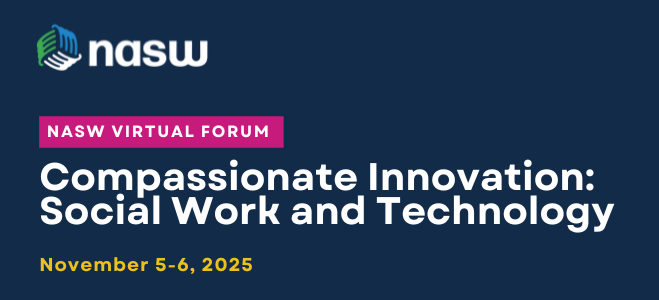
CE credit attainable subject to change. Earn up to 8 Live CE Contact Hours through the live event and access recorded sessions after the event to claim an additional 8 on-demand Self-Study CEs.
Wednesday, November 5
11:45 am EST
Opening Remarks & Keynote: Technology and Mental Health Care
Overview
1 Social Work Credit
11:45am - 12:00pm ET - Opening Remarks
12:00pm - 1:00pm ET - Keynote Presentation
More information coming soon.
Speaker(s)
Daniel Barron, MD, PhD, Medical Director of the Interventional Pain Psychiatry Program, Brigham and Women's Hospital
Dr. Karen Bullock, PhD, LICSW, FGSA, APHSW-C, President Elect, NASW
1:00 pm EST
Break (15 mins)
1:15 pm EST
Breakout Session 1a: Online Safety Trends and Resources: What You Should Know
Overview
1 Social Work Credit
In this session, we will explore data and trends in online safety, including online enticement and sextortion, and how some of these issues can affect children both online and in "real life." We will also discuss recognizing early warning signs, prevention strategies, and how to empower social workers, children, and families with free tools and resources.
Speaker(s)
Belinda B. Swan, MPAff, Senior Program Manager-Outreach and Partnerships, National Center for Missing and Exploited Children
1:15 pm EST
Breakout Session 1b: From Curiosity to Capability: Introducing Tech to People with IDD and Their Circles of Care
Overview
1 Social Work Credit
What happens when people with intellectual and developmental disabilities (IDD) are introduced to technology—not as a distant concept, but as a tool for everyday empowerment? In this session, you'll learn how The Arc designed and delivered accessible AI training for people with IDD and their caregivers, fostering curiosity, confidence, and connection. From demystifying what AI is to building practical skills and inclusive support systems, this presentation explores how compassionate innovation can open doors to greater independence, engagement, and digital belonging.
Speaker(s)
Janniece Sleigh, Executive Director, The ARC of Harris County
1:15 pm EST
Breakout Session 1c: EHRs, AI & Social Work: Charting A Path Forward in A Fast-Changing Environment
Overview
1 Macro Social Work Credit
Technology is impacting the practice of social work. On the one hand, the National Association of Social Workers is one of the founding members of Behavioral Health Information Technology Coalition seeking to provide line social workers with health IT systems. At the same time, new artificial intelligence chatbots present both opportunities and threats to the profession. But there is a clear path forward.
Speaker(s)
Alfonso Guida Jr., J.D., President & CEO, Guide Consulting Services, Inc.
2:15 pm EST
Break (15 mins)
2:30 pm EST
Breakout Session 2a: Rooted in Access: Who is Left Offline?
Overview
1 Social Work Credit
In an increasingly digital world, many rural and marginalized populations remain disconnected due to limited internet and technology access. This session explores the impact of the digital divide and offers strategies to promote digital equity in rural communities. Participants will gain tools to help bridge access gaps and support individuals, families, and communities through equitable digital inclusion.
Speaker(s)
Rebekah Dunaway, MSW, MPA, LGSW- BSW, Recruitment and Advising Coordinator and Clinical Instructor, West Virginia University
Challice LaRose, MSW, LGSW, BSW, Online Coordinator & Clinical Instructor, West Virginia University
2:30 pm EST
Breakout Session 2b: Beyond Burnout: How Technology + Task Strategies Create Space for Rest and Renewal
Overview
1 Social Work Credit
In a profession built on compassion, social workers often carry the weight of others while neglecting their own capacity for rest. Beyond Burnout: How Technology + Task Strategies Create Space for Rest and Renewal explores how intentional use of technology and practical task management can transform self-care from an afterthought into a sustainable practice. Participants will learn actionable strategies to reduce overwhelm, protect their energy, and use innovative tools to create balance and longevity in their work.
Speaker(s)
Dr. Marya Wright, LCSW
2:30 pm EST
Breakout Session 2c: Artificial Intelligence in Health Insurance: Policy Protections for Mental Health and Substance Use
Overview
1 Macro Social Work Credit
This session will review how artificial intelligence (AI) is currently being used in health insurance and the policy landscape on how it is regulated, and how it is not. The session will also identify opportunities and recommendations for stronger protections.
Speaker(s)
Deborah Steinberg, J.D., Senior Health Policy Attorney, Legal Action Center
3:30 pm EST
Break (15 mins)
3:45 pm EST
Plenary: Exploring AI in Social Work Practice: Challenges, Opportunities, and What Comes Next
Overview
1 Social Work Credit
Social work is entering a new era of practice as AI tools become part of our professional landscape. This session offers a conversation about what AI means for social workers, drawing on current research and practitioner perspectives to explore the opportunities and challenges shaping practice today. Participants will leave with a clearer sense of how to approach AI with curiosity and critical thinking as we consider what comes next for the profession.
Speaker(s)
Johanna Creswell Báez, PhD, LCSW, Assistant Professor & MSW Director, University of Colorado, Social Work Department, Colorado Springs
Yvonne Elder Chase, PhD, LCSW, ACSW, President, National Association of Social Workers, Associate Professor, University of Alaska
Thursday, November 6
11:45 am EST
Opening Remarks & Keynote: Artificial Intelligence in Social Work: Emerging Ethical and Risk Management Issues
Overview
1 Ethics Credit
11:45am - 12:00pm Opening Remarks
12:00pm - 1:00pm Keynote
Artificial intelligence (AI) is becoming increasingly prevalent in social work to conduct client risk assessments, assist people in crisis, strengthen prevention efforts, record clinical notes, identify systemic biases in the delivery of social services, provide social work supervision and education, and predict social worker burnout and service outcomes, among other uses. This presentation will examine cutting-edge ethical issues related to social workers’ use of AI; apply relevant ethical standards; and outline elements of a strategy for social workers’ ethical use of AI. Dr. Frederic Reamer will examine ethical issues and risks related to informed consent and client autonomy; privacy and confidentiality; transparency; potential client misdiagnosis; client abandonment; client surveillance; plagiarism, dishonesty, fraud, and misrepresentation; algorithmic bias and unfairness; and use of evidence-based AI tools.
Speaker(s)
Dr. Karen Bullock, PhD, LICSW, FGSA, APHSW-C, President Elect, NASW
Frederic G. Reamer, PhD, Professor Emeritus, School of Social Work, Rhode Island College
1:00 pm EST
Break (15 mins)
1:15 pm EST
Breakout Session 3a: Technology Safety & Abuse in Later Life
Overview
1 Social Work Credit
This session explores the complex dynamics of abuse in later life, highlighting its connection to elder abuse and the role of ageism in perpetuating harm. It challenges common misconceptions about older adults’ use of technology and examines how trusted individuals may misuse digital tools to exert power and control. Participants will learn strategies social workers can use to protect the privacy and safety of older adults who have experienced technology-facilitated abuse. The session also covers effective assessment and intervention approaches to address abuse behaviors involving technology.
Speaker(s)
Victoria Ferguson-Young, MDiv, Victim Services Coordinator, National Clearinghouse on Abuse in Later Life
Ann Laatsch, JD, Justice System Coordinator, National Clearinghouse on Abuse in Later Life
1:15 pm EST
Breakout Session 3b: Mapping Digital Ecosystems for Well-Being
Overview
1 Social Work Credit
This session explores how social workers can leverage digital tools and data systems to enhance client wellbeing. Participants will learn strategies for identifying and mapping the digital services that impact clients’ lives—from telehealth and benefits platforms to case management technologies. Through a lens of equity and ethical practice, the session will highlight ways to address digital divides, improve service coordination, and support economic mobility in the digital age.
Speaker(s)
Tianca Crocker, PhD, Assistant Professor, School of Social Work, UNC Charlotte
1:15 pm EST
Breakout Session 3c: Navigating Early Childhood Media Use with the 5 Cs Framework
Overview
1 Social Work Credit
The 5 Cs combine current research and evidence to inform parents about kids and screens based on their children’s developmental stages. They show how different developmental stages influence media use, and healthy media habits to strive for at home. The 5 Cs are designed to meet kids, teens and parents where they are, build insight and communication skills, and motivate for healthy behavior change.
Speaker(s)
Tiffany Munzer, MD, FAAP, Clinical Assistant Professor of Pediatrics, University of Michigan
2:15 pm EST
Break (15 mins)
2:30 pm EST
Breakout Session 4a: Innovations in Child Welfare Education Through Virtual Reality
Overview
1 Social Work Credit
Discover how immersive technologies are transforming social work education through the Florida Institute for Child Welfare’s Experiential Learning Lab. This session explores virtual reality and interactive digital tools that build empathy, decision-making skills, and trauma-informed practice.
Speaker(s)
Kyle Cook, M.A., Program Manager, Academic Innovation, Florida Institute for Child Welfare, FSU
Katerina Manias, M.A., Program Director of Learning Technology Integration, Florida Institute for Child Welfare, FSU
Malaika Samples, Ed.D., M.P.A., Florida Institute for Child Welfare
2:30 pm EST
Breakout Session 4b: Elements of Ethical Telehealth Practice: Part A: Location Matters-Members FAQ Part B: Mind the App: Ethical Use of Technology in Practice
Overview
1 Social Work Credit
two-part session explores key ethical considerations in telehealth practice. Part A, “Location Matters,” addresses questions when providing services across state lines. Part B, “Mind the App,” examines the ethical use of technology and therapy apps, highlighting privacy, confidentiality, and professional responsibility in the digital age.
Speaker(s)
Julie Black, LCSW-C, Sr. Ethics and Professional Review Associate, NASW Office of Ethics and Professional Review
Joanne Hessmiller, PhD, LCSW, NASW National Ethics Committee
2:30 pm EST
Breakout Session 4c: Prompting for Practice: Using AI Tools Across Micro, Mezzo, and Macro Social Work
Overview
1 Social Work Credit
This is an interactive virtual session designed to help social workers build practical AI literacy for everyday practice. Participants will learn how to craft effective prompts using tools like ChatGPT to enhance clinical interventions, documentation, program planning, and grant writing. The session explores real-world examples across individual, community, and organizational levels of practice, emphasizing ethical, equitable, and human-centered use of AI. Social workers will leave with ready-to-use strategies to integrate AI responsibly and a free guide with over 300 prompts for social work practice.
Speaker(s)
Dr. Marina Badillo-Diaz, LCSW, MABD Consulting
3:30 pm EST
Break (15 mins)
3:45 pm EST
Plenary: Where We Are and the Road Ahead: The Future of Social Work and Digital Tools
Overview
1 Social Work Credit
Wrapping up two days of discussions, insights, challenges, and opportunities at the intersection of technology and social work, this session will help chart a course for where we need to go next, and highlight ideas for how we might get there on behalf of our profession and the clients and communities we serve.
Speaker(s)
Dr. Lauri Goldkind, PhD, Graduate School of Social Service, Fordham University
| Access Date | Quiz Result | Score | Actions |
|---|








